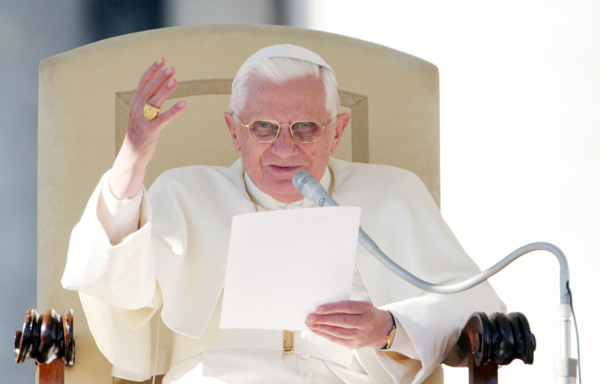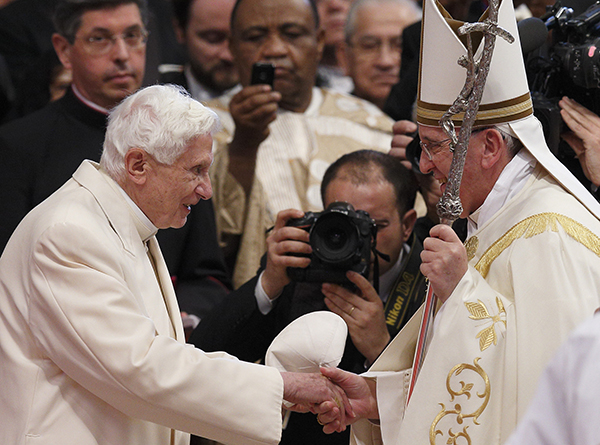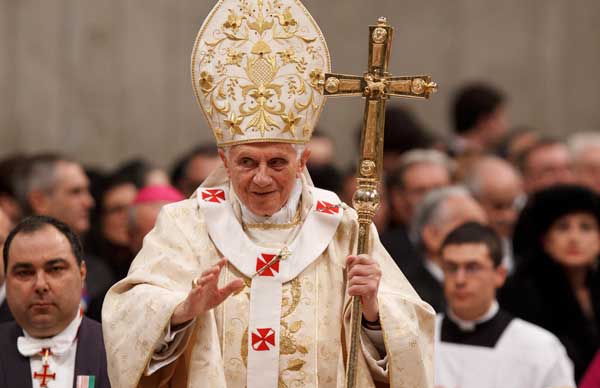
Pope Benedict XVI waves to the crowd during one of his weekly general audiences in St. Peter’s Square at the Vatican in 2007. RNS photo by Gregory A. Shemitz
(RNS) When Benedict XVI stunned Catholics by announcing that he would become the first pope in six centuries to resign, it immediately raised concerns — which were dismissed just as quickly — that an ex-pope around could undermine the legitimacy of the new pontiff.
Now, nearly two years later, those fears are emerging again, fueled by the growing discontent of conservative Catholics with Benedict’s successor, Pope Francis, and by Benedict’s presence, if not quite as a player, in church debates Francis has sparked.
“Benedict is hanging back for now, but there’s no doubt that he could easily become a figurehead for traditionalists harkening back to the good old days,” Notre Dame New Testament professor Candida Moss and Joel Baden, Old Testament professor at Yale Divinity School, warned in a Daily Beast column earlier this month.
Hubert Wolf, a church historian at the University of Münster, echoed those thoughts in comments reported by a leading German newspaper last week, when he said there were worries that “around Francis and Benedict XVI, two competing power centers could come into being in the (Roman) Curia, with pope and anti-pope at the top of each.”
What’s fueling these fears? They seem outlandish, almost medieval. But there are at least four factors at work:
1. “There is another pope still living!”
New York Times columnist Ross Douthat, a Catholic who has become something of a spokesman for conservatives, made that point in a widely circulated column warning that Francis could provoke a schism on the right.
His statement seems both obvious and perilous: If there’s “another pope,” that means there is a potential rival to the throne.
But the “two living popes” meme isn’t actually true, even though it keeps getting repeated.

Retired Pope Benedict XVI greets Pope Francis at the conclusion of a consistory at which Pope Francis created 19 new cardinals in St. Peter’s Basilica at the Vatican Feb. 22. Pope Benedict’s presence at the ceremony marked the first time he had joined Pope Francis for a public liturgy. Photo by Paul Haring, courtesy of Catholic News Service
“There is only one pope and his name is Francis, whether people like him and the direction he is steering Roman Catholicism or not,” wrote Christopher Bellitto, a church historian at Kean University, in a column for Reuters.
“There is not more than one president or prime minister because predecessors are still alive,” Bellitto wrote. “A person holds the office of president, prime minister, or pope. When that person no longer holds that office, then that person is no longer president, prime minister, or pope.”
2. Conspiracy theories won’t die
Good luck telling that to some Catholics and conspiracy-lovers, who have propounded a number of theories they say undermine Francis’ claims to the papacy.
Among them: Benedict used incorrect Latin in his formal resignation letter, so it is invalid; alternately, they say, the cardinals in the March 2013 conclave that elected Francis violated certain procedures, so his election is null and void.
The speculation was so insistent that on the first anniversary of his resignation last February, an exasperated Benedict publicly called notions that he was still pope “simply absurd.”

Pope Benedict XVI leaves Christmas Eve Mass in St. Peter’s Basilica at the Vatican on Dec. 24, 2012. RNS photo by Paul Haring/Catholic News Service
3. If he walks like a pope …
Despite his protests, Benedict hasn’t exactly helped the situation by keeping his papal name, continuing to wear the distinctive white papal cassock and taking the title — which he created for himself — of “pope emeritus.” Some church experts say he could have instead gone back to a black cassock and his baptismal name, Joseph Ratzinger, and used the title “bishop emeritus of Rome” or simply Cardinal Ratzinger.
“Juridically there is only one pope. A ‘pope emeritus’ cannot exist,” Manuel Jesus Arroba, a professor of canon law at the Pontifical Lateran University, warned in the days after Benedict announced the innovation.
The debates about the legitimacy of the title and papal perks have shown no sign of abating, and that feeds the conspiracy frenzy, which in turn sparks more debates about the wisdom of Benedict’s post-retirement choices.
4. And talks like a pope …
When Benedict retired, he said he would remain “hidden to the world,” living in seclusion in a monastery inside the Vatican walls. But Francis has encouraged Benedict to come out once in a while, and the former pope has not only taken part in some public events but also made his views known in letters and other communications.
No surprise, not all of his views seem to be in sync with those of Francis, which raises alarms among some, and hopes among others.
The latest example was when an edited volume of Benedict’s theological writings was published and it turned out he had deleted a key part of a 1972 essay in which he advocated a way for divorced and remarried Catholics to take Communion — a proposal that Francis has put on the table, to the intense displeasure of many conservatives.
Benedict’s redaction was seen as thwarting any effort to enlist him on the side of the reformers, and it placed him squarely in the center of the latest controversies.
In the end, it seems far-fetched to think Benedict would become an actual anti-pope or foment a real schism.
For one thing, at 87, he is too frail to take any active role in church governance. Moreover, nothing in his past record or his post-retirement statements gives any hint that he would even contemplate such a divisive step.
The problem is, it’s really not about Benedict; it’s about his followers. Their passion is likely to outlast the ex-pope himself.
YS/MG END GIBSON




